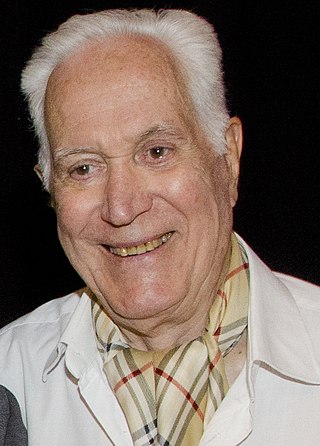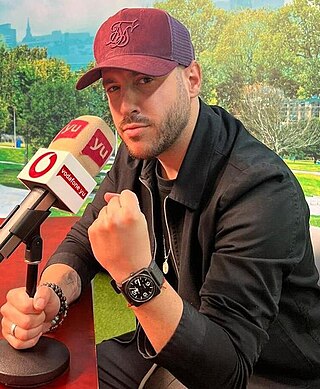
Flamenco is an art form based on the various folkloric music traditions of southern Spain, developed within the gitano subculture of the region of Andalusia, and also having historical presence in Extremadura and Murcia. In a wider sense, the term is used to refer to a variety of both contemporary and traditional musical styles typical of southern Spain. Flamenco is closely associated to the gitanos of the Romani ethnicity who have contributed significantly to its origination and professionalization. However, its style is uniquely Andalusian and flamenco artists have historically included Spaniards of both gitano and non-gitano heritage.

Ramón Melendi Espina, known as Melendi, is a Spanish singer-songwriter. His specialties are rock, flamenco, and rumba styles.

Julio Méndez Alemán was a Mexican actor.

Federico Luppi was an Argentine film, TV, radio and theatre actor. He won numerous awards throughout his acting career, including a Concha de Plata at the San Sebastian International Film Festival.
Cristina Sánchez Ruiz, better known as Cristie, is a Spanish R&B, Pop and flamenco singer.

María Lucía Sánchez Benítez, known as Malú, is a Spanish singer.
Polo is the name of a flamenco palo or musical form. There is only one known song in this palo, which is extremely similar to another palo called caña, and its guitar accompaniment, like the caña, shares its rhythm and motifs with soleá. Both the caña and polo share the same musical mode. The polo has usually been considered as a derivation of the caña. To complete the singing of the polo, singers usually sing a stanza in the palo of soleá, generally in the style called soleá apolá.
The Premio Adonáis, or Adonais Prize for Poetry, is awarded annually in Spain by Ediciones RIALP to an unpublished Spanish language poem. Runners-up are also recognized.

Antonio Machado Álvarez, better known by his pseudonym Demófilo, was a Spanish writer, anthropologist, and folklorist. He was the son of the noted Spanish folklorist, Cipriana Álvarez Durán.

Eva María Garrido García, known professionally as Eva Yerbabuena, is a Spanish flamenco dancer. She formed her own dance company in 1998 and won Spain's National Dance Award in 2001. She is considered one of flamenco's leading performers.

Antonio Carmona Amaya is a Spanish gypsy singer of flamenco. He also has French nationality. From the early 1980s, he was a member of the Spanish flamenco-fusion group Ketama. that he joined after main vocalist Ray Heredia left. The band also included José Soto also known as "Sorderita". Ketama in its latest set-up included Antonio Carmona as main vocalist along with his brother, Juan José Carmona Amaya known as "El Camborio", and his cousin, José Miguel Carmona Niño known as "Josemi".

Javier Limón is a record producer, singer and songwriter born and raised in Madrid, Spain. Limón has worked with several artists, mainly from Spain, since he incorporates elements of flamenco rhythm to his work. Besides his work as producer has also dabbled as an interpreter and has released three studio albums, Limón, Son de Limón and Mujeres de Agua. Since 2003, Limón has done recordings in Israel, Bogotá, Bristol, Paris, Bahía Blanca, Buenos Aires, New York City and Morocco. In 2004, Limón was awarded the Latin Grammy Award for Producer of the Year for his work on Lágrimas Negras by Diego El Cigala and Bebo Valdés, Cositas Buenas by Paco de Lucía, El Cantante by Andrés Calamaro, El Pequeño Reloj by Enrique Morente, Niño Josele by Niño Josele and Tributo Flamenco A Don Juan Valderrama by Various Artists. Javier Limón serves as the Artistic Director of the Berklee College of Music's Mediterranean Music Institute, which operates in Valencia, Spain as well as Boston, Massachusetts.
La Voz is a Spanish reality talent show broadcast on Antena 3. It premiered on 19 September 2012 and is part of the international syndication The Voice based on the original Dutch television program The Voice of Holland, created by Dutch television producer John de Mol.

Javier Antonio García Expósito is a dancer and choreographer. He debuted at the age of sixteen in the National Lyric Company. In 1979, he joined the Ballet Nacional de España, as soloist under the direction of Antonio Gades. After receiving an award as the Festival d'Avignon, he founded in 1988 in Cordoba the Ziryab Danza of which he was director, choreographer and dancer. He had considerable success with the show Hijas del Alba. A year later, he received three national awards at the Concurso Nacional de Arte Flamenco. In 1990, he toured with the show La fuerza del destinoall over Europe, and participated as a guest artist with Mario Maya in Diálogos del Amargo. He collaborated on Concierto flamenco para un marinero en tierra with Vicente Amigo before winning the first prize in dance at the Festival del Cante de las Minas in 1994.
Ana Morales Moreno, known as Ana Morales, is a Spanish flamenco dancer and choreographer, who has established her own dance company.

Luis Cepeda Fernández, also known as Cepeda, is a Spanish singer and songwriter.
Daniel Casares is a Spanish flamenco guitarist and composer. He has recorded six solo albums, such as Duende flamenco (1999), La Madrugá (2001), Corazón de tu alma (2004), Caballero (2007), El Ladrón del Agua (2010) and Picassares (2015).

Antonio José Sánchez Mazuecos, known professionally as Antonio José, is a Spanish singer. He first gained recognition in 2005, after placing second in the Junior Eurovision Song Contest 2005 with the song "Te traigo flores".

Javier Rey is a Spanish actor. He is popular for his performance in the television series Cocaine Coast.

La Singla is a 2023 Spanish-German documentary film written and directed by Paloma Zapata about Flamenco dancer Antonia Singla.














